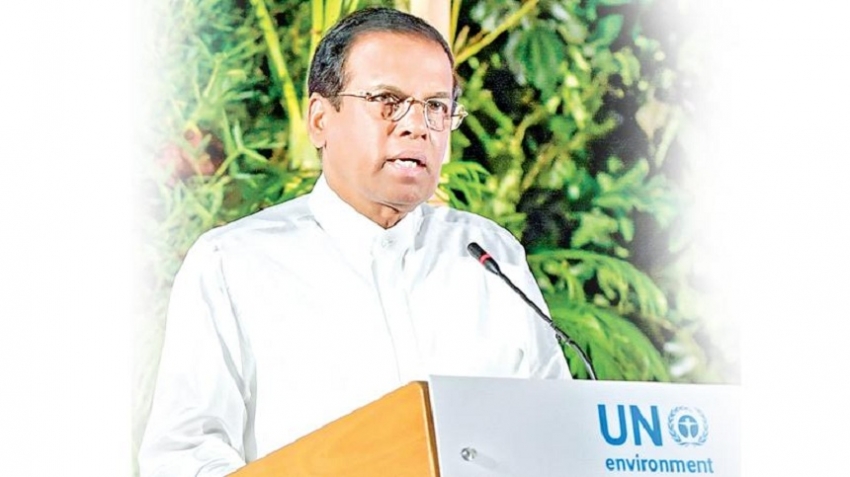President Maithripala Sirisena emphasized that Sri Lanka, as a country rich in nature, culture and heritage would like to capitalize on nature and nature related sustainable businesses to drive the socio-economic development. In that context the United Nations Environment Assembly (UNEA4) provides a sound base and tools towards managing and using nature, he said.
Speaking at the 4th Session of the UNEA in Nairobi, Kenya, on March 14, the President said, “Being a follower of the Buddhist philosophy, I firmly believe that we are responsible for securing the sustenance of, not only mankind, but also, life on earth as a whole.”
Sri Lanka signed the Paris Agreement, which is an unprecedented global commitment to combat climate change. Stressing Sri Lanka’s commitment to environment and nature preservation, President Sirisena attended the Paris Summit in 2016 and subsequent Assemblies in Singapore and Nairobi.Sri Lanka has been listed as the second highest in the global climate risk index of 2019, and implementing climate actions is vital to the country. “The biggest challenge faced by the farmers in Sri Lanka is the uncertain climatic conditions,” he told the UN Assembly. “Agriculture is the main source of livelihood for people living in the rural areas of Sri Lanka and it has much potential for greening and to be climate smart. We like to see that Sustainable Consumption and Production, and science and technology are applied in our agriculture,” President Sirisena said.
Saying that poverty is a significant cause for global environmental problems, he added that environment degradation and poverty are inter-related and inseparable, particularly, in developing countries.
“These problems provided us opportunities to be innovative. I am pleased and excited about the timely theme of UNEA4, which has captured most challenges faced by countries, including island nations such as ours,” he said.
Sri Lanka has submitted several proposals to the 4th UNEA in Nairobi to strengthen the capacity of countries in the Asia Pacific to face the challenges of climate changes and global warming. One proposal was to create an additional fund to assist developing countries to combat environmental challenges. Proposals were also submitted to ensure the reduction of food waste, mangrove conservation and reduce ocean pollution due to micro plastics.
The Nairobi Assembly reiterated that it is the prime duty of the human kind to assure the right to live in a safe environment and introduce environmentally sound economic trends that build upon sustainable global economic indices.
Sri Lanka initiated in co-sponsoring four resolutions along with other partnering countries on; Conservation of Mangroves, Marine Litter and Micro-plastics, Solid Waste Management, and Food Losses and Waste.
Sri Lanka is the first country in the South Asian region to prepare a Sustainable Consumption and Production Policy, with the assistance of SWITCH-ASIA Policy Support Initiative. She has taken several ground level smart initiatives for policy formulation and implementation toward greening under the ‘Blue-Green’ approach covering both land and ocean, the President said.
The National Policy on Urban Air Quality Management ensures clean air for a healthy nation or the ‘Clean Air 2025 Action Plan.’ In addition, Sri Lanka joined the ‘UN Clean Seas Campaign’ alongside UNEA-3, and developed a roadmap with a view to minimize land based ocean pollution. The country is also implementing a river basin and integrated coastal management approach to prevent ocean and water resource pollution that include plastics and chemicals.
President Sirisena said that at the recently concluded Commonwealth Heads of Governments Meeting (CHOGM), Sri Lanka pledged to be the Champion in the Action Group for Restoration of Mangroves under the Commonwealth Blue Charter. Approximately, 9,000 hectares of Mangrove Forest have been declared as a Conservation Forest.
Considering the need to protect coral reefs as one of the most sensitive ecosystems in the world, Sri Lanka has stepped forward to obtain membership of the International Coral Reef Initiative, networking with various other states. The country has taken steps to minimize unsustainable and destructive fishing practices that damage corals. Several initiatives are being taken in line with the Marine Environment Pollution Control Strategy 2030. Sri Lanka has identified the challenges of pollution due to intensive sea routes linking west to east.
Demonstrating the commitment towards achieving the UN 2030 Agenda for Sustainable Development, Sri Lanka was the first country to establish a separate Ministry for Sustainable Development, and established the Sustainable Development Council, to ensure that we meet the Sustainable Development Goals, President Sirisena told the Assembly. “In January 2019 I declared open the first green city designed and built by my Government, the Laggala Green City. It was built under the Moragahakanda – Kalu Ganga Multipurpose Reservoir Project.” This city accommodated over 3,000 families who were initially displaced when the Moragahakanda reservoir was first filled with water.
“In my capacity as Minister of Environment, I commenced a program in 2015 known as, Wanaropa, to increase the depleted forest cover from 29% to 32%, conserve bio-diversity and the natural eco-system and promote the management of commercial forestry and various other activities. October has been declared as the National Tree Planting Month, dedicated to raise awareness and tree planting, island wide,” President Sirisena said.
The Nairobi Assembly was an occasion for UN Environment partners, UN agencies, private sector representatives, scientists, academia, and civil society to bring their perspectives and ideas to achieve the environmental dimension of the 2030 Sustainable Development agenda.
President Sirisena declared that the 18th Conference of Parties of CITES will be hosted by Sri Lanka in May 2019.




















